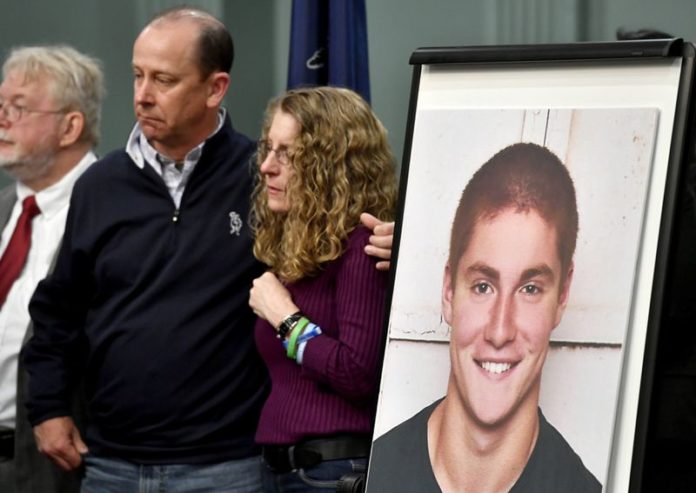This year, the U.S. House of Representatives and the U.S. Senate both unanimously passed the Stop Campus Hazing Act, and on Christmas Eve, President Joe Biden signed it into law. This legislation, championed by Democrats and Republicans alike, creates reporting standards in higher education, requires hazing prevention training for student leaders and administrators and penalizes schools who don’t operate with transparency. It is the product of six years of tireless advocacy from concerned Americans and the lawmakers who listened to them.
Political process stories might marvel at this rare dose of bipartisanship in Washington, but what was more remarkable was the unlikely collaboration that helped make it possible.
Jud is the president and CEO of the North American Interfraternity Conference (NIC), which represents 56 national men’s collegiate fraternities. Jim Piazza lost his son, Tim, to a senseless fraternity related hazing death in 2017. After seeing Jud’s appearance on CBS Morning following the incident, Jim invited Jud to meet with him and another father who also lost his son to hazing.
At our first meeting, we knew we had a lot of ground to cover. We listened to each other, and on behalf of men’s fraternal organizations, Jud demonstrated a spirit of humility and cooperation. We expressed a mutual commitment to preventing hazing by better educating students, families and universities. We knew the status quo was simply unacceptable. And, because a majority of hazing deaths during this period involved fraternities, we knew we urgently needed to take the lead on stopping it.
Over time, apprehension grew into trust, and together, we helped to assemble a powerful coalition of affected families, higher education experts, Greek organizations and lobbyists who worked on a pro-bono basis for six years. We knew that major legislative and regulatory reforms were needed at the federal, state and collegiate level. What those looked like – and who would be a part of crafting and implementing them – became topics of debate. So much of our effort involved compromises and concessions across a broad coalition of varying backgrounds, bringing together people who might normally be on opposing sides to accomplish something big.
Though many have quipped that this coalition makes “strange bedfellows,” we really aren’t. We are in steadfast agreement that hazing is our common enemy, and by working together, we could achieve far more progress than trying alone.
As the coalition dug into the problem, we soon realized that hazing is a reality for college campuses far beyond Greek life. A 2019 analysis from NASPA, a trade association of collegiate administrators, confirms that these activities occur across “a range of student groups,” with the majority of participants in varsity athletics, club sports, Greek organizations, performing arts organizations and service organizations reporting they’re also subject to behavior that meets the definition of hazing.
Such destructive behavior often begins long before these young adults step foot on a university campus. Hazing in high school remains a persistent problem, and according to the Hazing Prevention Network, approximately half of all students endure some form of it before college. In fact, research indicates high schoolers are just as likely to engage in hazing practices as college students, making prevention prior to higher education a necessity.
Hazing is dangerous and destructive, not an acceptable rite of passage. Young adults in this country deserve to experience the benefits of bonding and belonging without being subject to coercion or cruelty.
This federal legislation, along with more than a dozen states which have recently strengthened their anti-hazing laws, are important milestones in our quest to eradicate hazing. We also know that laws alone won’t win this fight, which is why we have introduced prevention programming to more than 400,000 students since 2017.
Our experience passing this federal law taught us that, amid the gridlock that has characterized much of policymaking in recent years, it is, indeed, possible to pass policies that help real people. Often, this process isn’t glamorous; the lengthy give-and-take it requires won’t make splashy headlines in a media environment that prioritizes drama over results. But it is still vital to pursuing the public good.
The Stop Campus Hazing Act proves it can still be done.
Judson Horras is the president and CEO of the North American Interfraternity Conference. Jim Piazza is one of the founding members of the Anti-Hazing Coalition.




